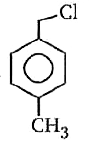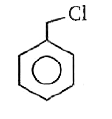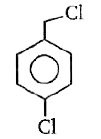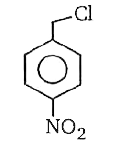Which of the following is not true for SN1 reaction ?
They occur through a single step concerted reaction
They are favoured by polar solvents
3∘ alkyl halides generally react through this mechanism
Concentration of nucleophile does not affect the rate of such reaction
The correct Answer is:A
To determine which statement is not true for the SN1 reaction, we need to analyze each of the provided options.
1. Understanding SN1 Mechanism:
- The SN1 (Substitution Nucleophilic Unimolecular) reaction is a two-step mechanism. The first step involves the formation of a carbocation, and the second step involves the nucleophile attacking the carbocation.
2. Analyzing the Options:
- Option A: "They occur through a single step concerted reaction."
- This statement is not true. The SN1 reaction occurs through two steps: the formation of a carbocation and the subsequent attack by the nucleophile.
- Option B: "They are favored by polar solvents."
- This statement is true. Polar solvents stabilize the carbocation intermediate formed during the reaction, making the SN1 reaction more favorable.
- Option C: "Tertiary alkyl halides generally react through this mechanism."
- This statement is true. Tertiary alkyl halides form stable tertiary carbocations, which favor the SN1 mechanism.
- Option D: "Concentration of nucleophile does not affect the rate of such reaction."
- This statement is true. In SN1 reactions, the rate is determined only by the concentration of the alkyl halide, as the formation of the carbocation is the rate-determining step.
3. Conclusion:
- The only statement that is not true for the SN1 reaction is Option A: "They occur through a single step concerted reaction."
Final Answer:
Option A is the statement that is not true for SN1 reactions.
---
- The SN1 (Substitution Nucleophilic Unimolecular) reaction is a two-step mechanism. The first step involves the formation of a carbocation, and the second step involves the nucleophile attacking the carbocation.
- Option A: "They occur through a single step concerted reaction."
- This statement is not true. The SN1 reaction occurs through two steps: the formation of a carbocation and the subsequent attack by the nucleophile.
- Option B: "They are favored by polar solvents."
- This statement is true. Polar solvents stabilize the carbocation intermediate formed during the reaction, making the SN1 reaction more favorable.
- Option C: "Tertiary alkyl halides generally react through this mechanism."
- This statement is true. Tertiary alkyl halides form stable tertiary carbocations, which favor the SN1 mechanism.
- Option D: "Concentration of nucleophile does not affect the rate of such reaction."
- This statement is true. In SN1 reactions, the rate is determined only by the concentration of the alkyl halide, as the formation of the carbocation is the rate-determining step.
- The only statement that is not true for the SN1 reaction is Option A: "They occur through a single step concerted reaction."
Option A is the statement that is not true for SN1 reactions.
Topper's Solved these Questions
- HALOALKANES AND HALOARENES BOOK - AAKASH INSTITUTE ENGLISHCHAPTER - HALOALKANES AND HALOARENES EXERCISE - ASSIGNMENT SECTON - A
45 Videos
- HALOALKANES AND HALOARENES BOOK - AAKASH INSTITUTE ENGLISHCHAPTER - HALOALKANES AND HALOARENES EXERCISE - ASSIGNMENT SECTION - B
25 Videos
- HALOALKANES AND HALOARENES BOOK - AAKASH INSTITUTE ENGLISHCHAPTER - HALOALKANES AND HALOARENES EXERCISE - Try Yourself
40 Videos
- GENERAL PRINCIPLES AND PROCESSES OF ISOLATION OF ELEMENTSBOOK - AAKASH INSTITUTE ENGLISHCHAPTER - GENERAL PRINCIPLES AND PROCESSES OF ISOLATION OF ELEMENTSEXERCISE - Try Yourself
33 Videos
- HYDROCARBONSBOOK - AAKASH INSTITUTE ENGLISHCHAPTER - HYDROCARBONSEXERCISE - Assignment(Section - C) (Previous Years Questions)
60 Videos
Similar Questions
Knowledge Check
Which of the following is most reactive towardSN2 reaction ?
A B
B C
C D
D
Which of the following is most reactive towardSN2 reaction ?
ACH2=CH−CH2−ClBPh−CH2−ClC DPh−C∣∣O−CH2−Cl
DPh−C∣∣O−CH2−ClWhich of the following statement regarding SN1 reaction shown by alkyl halide is incorrect?
AThe added nucleophile plays no kinetic role in SN1 reaction.BThe SN1 reaction involves the inversion of configuration of the optically active substrate.CThe SN1 reaction on the chiral starting material ends up with racemisation of the product.DThe more stable the carbocation intermediate the faster the SN1 reaction.
Which of the following solvent is suitable for SN1 reaction ?
View SolutionWhich of the following is an SN2 reaction:-
View SolutionWhich of the following is always true for a reaction
View SolutionWhich of the following reactions take place by SN2 reaction?
View SolutionWhich of the following compounds will not give SN2 reaction?
View Solution
